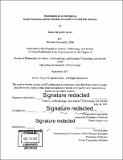| dc.contributor.advisor | Christopher Capozzola. | en_US |
| dc.contributor.author | Burks, Marie Elizabeth | en_US |
| dc.contributor.other | Massachusetts Institute of Technology. Program in Science, Technology and Society. | en_US |
| dc.date.accessioned | 2019-03-01T19:54:42Z | |
| dc.date.available | 2019-03-01T19:54:42Z | |
| dc.date.copyright | 2017 | en_US |
| dc.date.issued | 2017 | en_US |
| dc.identifier.uri | http://hdl.handle.net/1721.1/120645 | |
| dc.description | Thesis: Ph. D. in History, Anthropology, and Science, Technology and Society (HASTS), Massachusetts Institute of Technology, Program in Science, Technology and Society, 2017. | en_US |
| dc.description | Cataloged from PDF version of thesis. | en_US |
| dc.description | Includes bibliographical references (pages 194-206). | en_US |
| dc.description.abstract | Through the mode of conceptual history, this dissertation examines some of the forms dissent could take within academic social science in the United States from roughly 1945-1970. The concept in question is "conflict." There are many stories one could tell about this concept and its transformations in postwar American social science, but in this dissertation I focus on one in particular: how certain social scientists sought to frame conflict as a problem of knowledge, by stretching the concept to fit the global proportions of the bipolar world that seemed to have emerged from World War II, and then using that conceptualization to oppose the Cold War. The dissertation first considers a specific moment of conceptual change, when some social scientists sought to redefine "conflict" in the immediate aftermath of World War II, so that it would be capacious enough to describe conflict at all levels of analysis, from the intrapersonal to the international. From there, it follows a cadre of social scientists who used that novel conceptualization to build an intellectual movement around a new journal and research center starting in the mid- 1950s. The scholars who participated in that movement, known as "peace research" or ''conflict resolution," endeavored to construct a "general theory of conflict," which they would then employ to challenge the notion that the Cold War was inevitable. The language of mid-century social science was the idiom in which they expressed their dissent. Although this was to become an international movement, this dissertation focuses on its American incarnation, which came to fruition at the University of Michigan in Ann Arbor beginning around 1957. The dissertation then looks closely at how two of the leading theorists of that movement modeled conflict in the early 1960s, and considers the ethical and political impulses that animated their work, demonstrating that it was possible for some intellectuals to inhabit the dual role of academic social scientist and social critic in the early 1960s. It concludes with a brief set of reflections on the United States Institute of Peace, an independent federal institute established in 1984 to embody the dream of "conflict resolution." | en_US |
| dc.description.statementofresponsibility | by Marie Elizabeth Burks. | en_US |
| dc.format.extent | 206 pages | en_US |
| dc.language.iso | eng | en_US |
| dc.publisher | Massachusetts Institute of Technology | en_US |
| dc.rights | MIT theses are protected by copyright. They may be viewed, downloaded, or printed from this source but further reproduction or distribution in any format is prohibited without written permission. | en_US |
| dc.rights.uri | http://dspace.mit.edu/handle/1721.1/7582 | en_US |
| dc.subject | Program in Science, Technology and Society. | en_US |
| dc.title | Meditations in an emergency : social scientists and the problem of conflict in Cold War America | en_US |
| dc.type | Thesis | en_US |
| dc.description.degree | Ph. D. in History, Anthropology, and Science, Technology and Society (HASTS) | en_US |
| dc.contributor.department | Massachusetts Institute of Technology. Program in Science, Technology and Society | |
| dc.identifier.oclc | 1088407842 | en_US |
